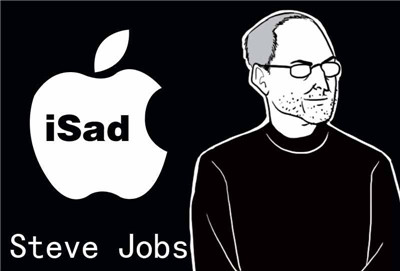(单词翻译:单击)
Steve Jobs’ acolytes say Becoming Steve Jobs paints a more fitting picture of the Apple founder than Walter Isaacson’s “authorised” 2011 life. Most neutral readers who plough through another 435 pages of Jobsiana, will neither know nor care. But the battle of the bios will have been worth it if it sounds the death-knell for the worst of all management memes: the leadership lesson listicle.
史蒂夫•乔布斯(Steve Jobs)的拥趸称,《成为史蒂夫•乔布斯》(Becoming Steve Jobs)塑造的这位苹果(Apple)创始人的形象,比2011年沃尔特•艾萨克森(Walter Isaacson)的那本“授权版”乔布斯传记要贴切得多。而绝大多数埋头苦读又一本关于乔布斯轶事长达435页书籍的中立读者,可能既也不会知道也不会在乎这一点。不过,如果能够为一种最糟糕的管理学谜米(meme)——领导力经验清单体(Listicle)——敲响丧钟的话,这场乔布斯传记之争也就值得了。

In the short term, the new book, by Brent Schlender and Rick Tetzeli, has reinvigorated the habit. You do not have to look far to find Five Surprising Insights About Steve Jobs’ Management Style (Fast Company), Six Leadership Lessons (Mashable), and Eight Lessons You Can Learn From Watching Young Steve Jobs Run a Meeting (Time), all culled from the new book.
短期来看,这本由布伦特•施伦德(Brent Schlender)和里克•特策利(Rick Tetzeli)合著的新书让这种体例重新焕发了生机。你无需费力就能在《快公司》杂志(Fast Company)上发现《关于史蒂夫•乔布斯管理风格的5条惊人见解》(Five Surprising Insights About Steve Jobs’ Management Style),在Mashable上看到《6条领导力经验》(Six Leadership Lessons),在《时代》周刊(Time)上浏览到《看年轻乔布斯开会能教给你的8条经验》(Eight Lessons You Can Learn From Watching Young Steve Jobs Run a Meeting)。这些文章均摘自这本新书。
Isaacson’s biography itself spawned Ten Leadership Tips from Steve Jobs (Forbes), Six Management Lessons (Globe and Mail) and 14 Real Leadership Lessons, drawn up by the biographer, who tried to reclaim the genre with a 2012 piece for Harvard Business Review.
而艾萨克森所著的乔布斯传记本身就已催生了《从史蒂夫•乔布斯身上学到的10个领导诀窍》(Ten Leadership Tips from Steve Jobs,刊登在《福布斯》杂志(Forbes)上)、《6条管理学经验》(Six Management Lessons,刊登在《环球邮报》(Globe and Mail)上)以及由艾萨克森本人撰写的《14条实实在在的领导经验》(这位传记作者试图以这篇2012年刊登于《哈佛商业评论》(Harvard Business Review)上的文章夺回该体例的阵地)。
I occasionally succumb to the same temptation. I have listed the leadership lessons taught by ageing popes and capricious football managers. One of my best-read blogposts of 2012 was actually a derivative of the Isaacson HBR piece. I also understand the appetite of muddled managers for something short, simple and usable. Numbered lists are often the easiest way to sell a concept, which is why so many strategy gurus use them.
我偶尔也会屈服于同样的诱惑。我也罗列过年事渐高的教皇和随心所欲的足球经理交给我们哪些领导力经验。我2012年所写的其中一篇阅读量最高的博客文章,实际上与艾萨克森发在《哈佛商业评论》上的那篇文章半斤八两。我也知道,脑子里一团乱麻的经理人喜欢读的是短小、简单又实用的文章。要推销一个概念,最容易的方法往往就是列清单、标出一二三四五,这也是如此多策略大师都使用清单体的原因。
But the Jobs biographies highlight the dangers of list dependency. Here is how — in list form, naturally.
但是,两本乔布斯传记突显了依赖清单体的危害。以下列举了原因——自然,也是用清单的形式列出来的。
1. Leadership listicles can be absurd to the point of inanity. Biographies give their authors space to deal with every quirk and wrinkle of their subjects and readers the option to draw the conclusions that best suit their situation. Listicles do the opposite. A recent collection of lessons from the new series of House of Cards was vacuous enough. But its insights have the weight of peer-reviewed academic papers compared with the leadership lessons of Fifty Shades of Grey, King Saul or James Bond (all real examples). It would be fine if this were just a bit of fun, which it often is, but at the same time . . .
1.关于领导力题材的清单体文章可以荒唐到极点。传记这种体裁,给了作者足够的篇幅来描写传主的每一个怪癖和缺点,让读者能够从中提炼出最适合自身情况的结论。而清单体正好相反。近期从最新美剧《纸牌屋》(House of Cards)中总结的经验清单已经够空洞的了。但是与《五十度灰》(Fifty Shades of Grey)、扫罗王(King Saul)或者詹姆斯•邦德(James Bond)带给我们的领导力经验(都是真实存在的文章)相比,从《纸牌屋》中总结的经验清单简直就像经过同行评审的学术论文一样权威了。如果这类文章只是搞笑的话还好,事实上它们通常很好笑,但同时……
2. . . Listicles package leadership into a misleadingly neat parcel. The Apple founder’s death brought a remarkable life to a premature end. As Jim Collins, the management writer, tells the authors of Becoming Steve Jobs, his third phase — from age 55 to 75 — “would have been fascinating . . . But we don’t get to see that”.
2.……这种清单体文章又把关于领导力的复杂学问误导性地包装成了简单利落的样子。这位苹果创始人的逝世使他的传奇人生提前终结。正如管理学图书作家吉姆•柯林斯(Jim Collins)向《成为史蒂夫•乔布斯》一书的作者所说的那样,乔布斯的第三阶段——从55岁到75岁——“本来会极其精彩……但是我们没机会看到了”。
In fact, leaders’ legacies, good or bad, outlive their departures. As Mr Collins adds, the things that make a truly great company are superior financial results, distinctive impact and lasting endurance. “Whether [Apple] has lasting endurance is the final check, something we won’t know for some time,” he says.
事实上,无论是好是坏,领袖人物的遗产会比他们本人更长寿。柯林斯补充称,成就一家真正伟大的公司的是出众的财务业绩、特殊的影响力以及持久的生命力。“(苹果)能够长久存在才是最终的检验标准,这是我们短时间内无法判断的,”他称。
3. The lessons learnt from leaders often depend on the student. One of the most obvious differences between Isaacson’s life of Jobs and the new biography is that the authors emphasise the man’s evolution from the young Jobs 1.0, who craved recognition for his management skills but was “confounded by the ins and outs of running a company”, to Jobs 2.0.
3.你能从领袖身上学到什么,往往取决于你自己。艾萨克森所著乔布斯传记和新传记之间最明显的区别之一在于,新传记的作者强调了乔布斯本人从年轻的乔布斯1代(Jobs 1.0)到乔布斯2代(Jobs 2.0)的进化。乔布斯1代渴望得到人们对他管理才能的认可,但却“被具体的企业管理事务搞得不知所措”。
By his second attempt at leading Apple, they suggest, Jobs had become an “effective visionary” and a genuine “business genius” (their emphasis). His colleagues appreciated his more mature, softer side. Isaacson, while granting Jobs the same status as Henry Ford or Thomas Edison, found as many people prepared to testify that he was, to the end, “charismatic and inspiring, yet also . . . an asshole”.
他们认为,在第二次尝试领导苹果时,乔布斯已经成为“能实现自己想法的梦想家”和真正的“商业奇才”(他们写作的侧重点)。他的同事们意识到了他有更成熟、更温和的一面。把乔布斯与亨利•福特(Henry Ford)和托马斯•爱迪生(Thomas Edison)相提并论的艾萨克森却认为,乔布斯如许多人愿意证明的那样,归根到底,“尽管富有魅力和感召力,但同时……也是混蛋一个”。
4. Form often dictates listicle substance. In the quest for concision, more nuanced lessons may be omitted, or alternatively . . .
4.清单体的形式往往大于内容。为了追求简明,较为复杂的经验可能被忽略,或者……
5. . . the last item in any listicle may be stretched to conform to the unwritten rule that any such list must have at least five components.
5.……任何一篇清单体文章的最后一条可能都是强加进去的,这是为了遵从一条不成文的规定,即所有这类清单必须列出至少5条。
I have met more than one executive who claims to read the lives of great men and women rather than list-prone business books. It is a wise choice, but still needs care. The final reason it can be perilous to study tidily presented insights is that some lessons are unrepeatable sparks of genius, struck by one-off leaders. Instead of trying to mimic Jobs, listen to Bill Gates. He tells Mr Schlender and Mr Tetzeli that Jobs was a unique case. “Maybe you should call your book Don’t Try This at Home,” he quips. It is the best leadership lesson in either biography.
我遇到过不止一位高管自称会阅读伟人(男人或女人)的生平而不是看清单体商业书籍。这是一个明智之选,但是也需要留心。学习这种排列整齐的观点之所以危险的最后一个原因是,某些经验是不可复制的灵光乍现,创造这些经验的那些领袖也都是独一无二的。与其尝试去模仿乔布斯,还不如听听比尔•盖茨(Bill Gates)的话。他告诉施伦德和特策利,乔布斯是个特例。“或许你们应该把这本书命名为《请勿在家模仿本书内容》(Don’t Try This at Home),”他打趣道。这就是两本传记中都包含的最佳领导力经验。


